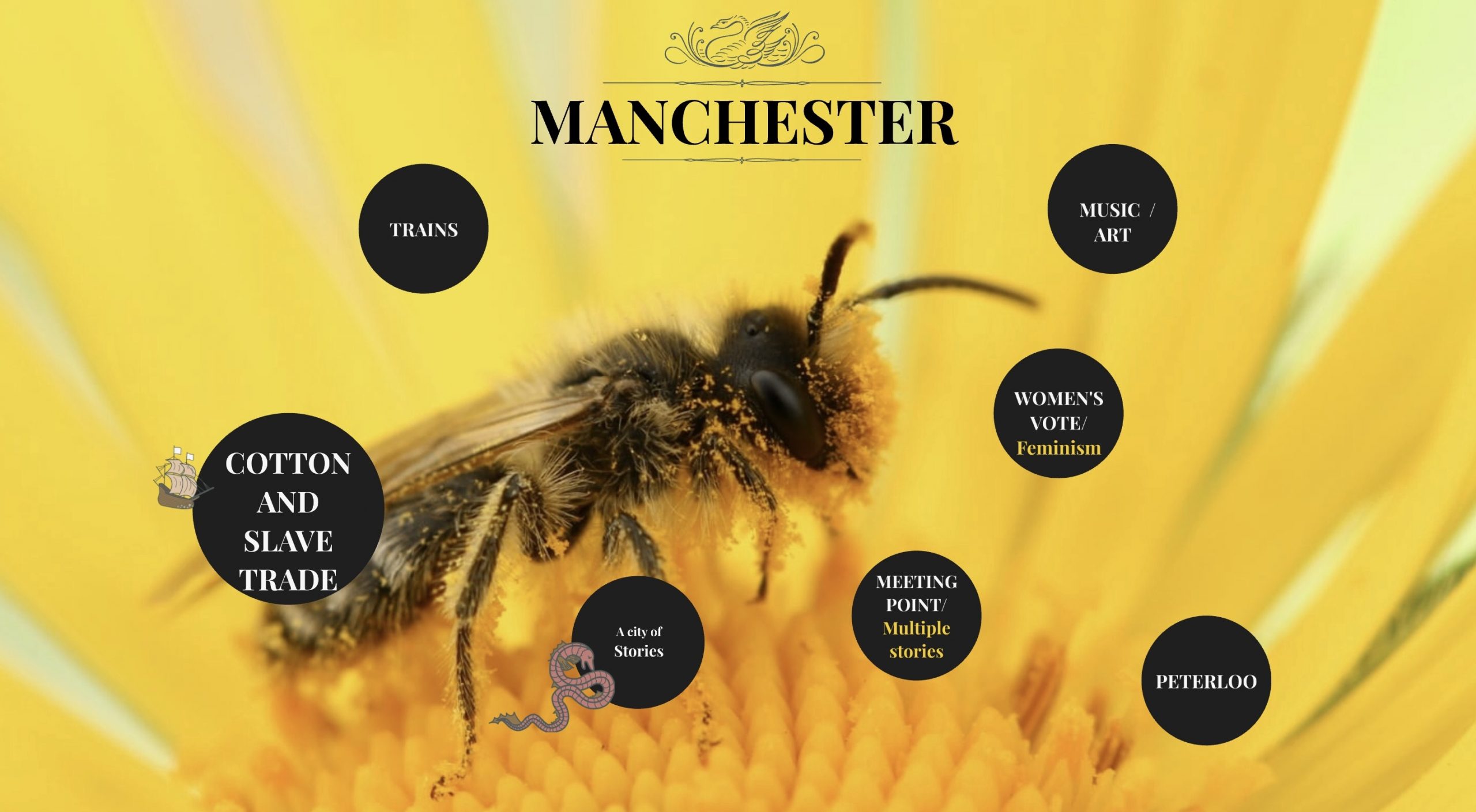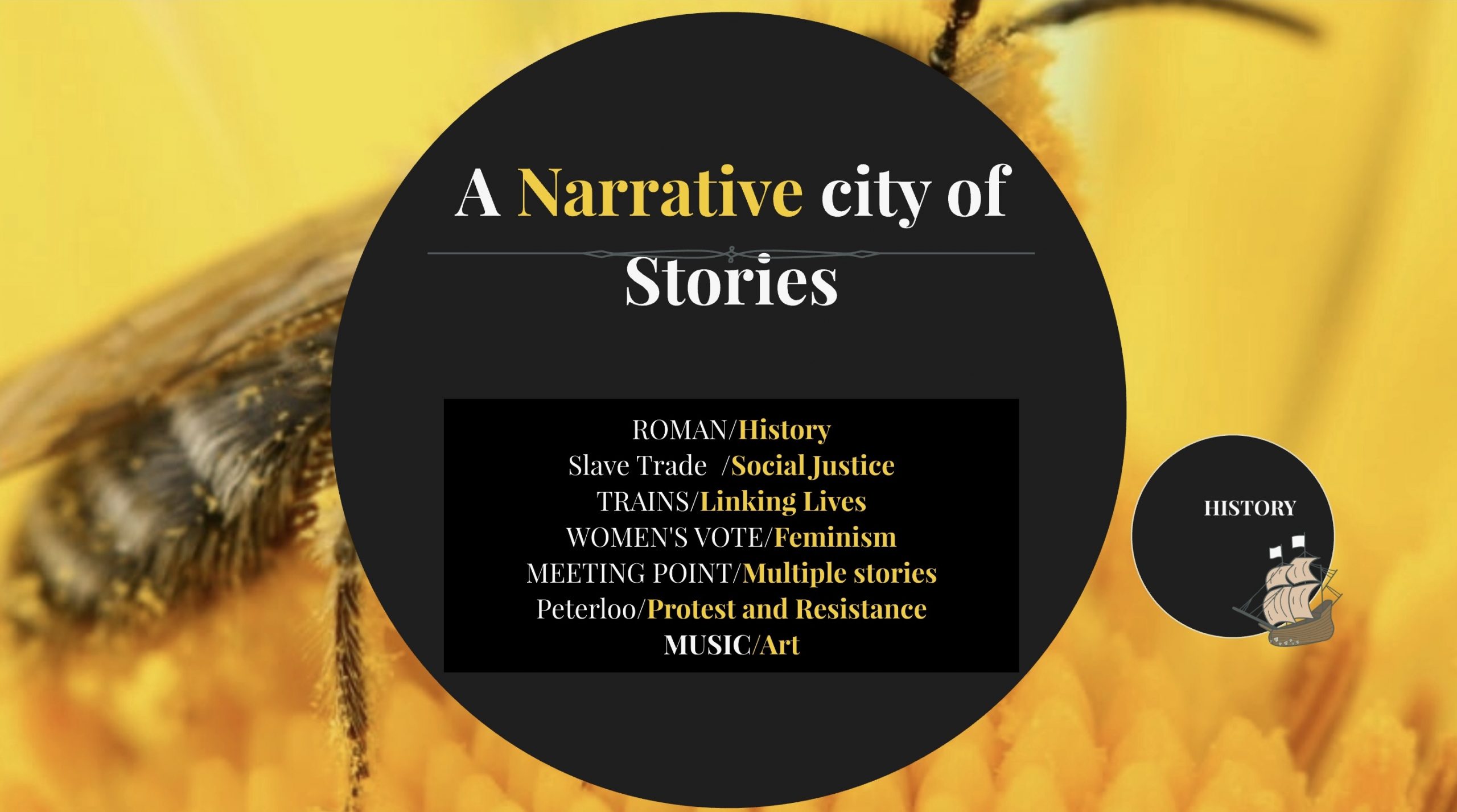Narrative Therapy Reports
Day of narrative conversations in Manchester

Desertification
Ben Dorey – benjamindorey.com
It’s when, via our doings,
the verdant land shrinks
under amplified sunlight
unable to escape;
when an overplanted crop
cracks the soil into patterns
repeating to arid infinity,
variety quickly retreating
into monotropy.
*
There’s something to be said for it,
a beauty formedx in measured miles
of soil and sand that stretch
the reaching eye towards horizons,
to indigo endings of insight –
It’s easy to see the full sweep of wind
reflected in rippling dunes
lined up like sets of waves on water,
tremoring slower and slower
*
The desert metamorphoses moisture
into sculptures of its absence
the way war becomes numbers
and maps of moving borders,
becomes BREAKING on ribbons
wrapping news screens;
the way famine is made up of millions
and logistical questions in brains
which shield us from the pain of unsalted blood
or too salted tears which mark the moment
a cradle of stories becomes
a bundle of bones.
*
Desertification is the metempsychosis
of a life up to now
into words that buckle the soul
beneath the weight of their burden,
pinning it into the ground:
Soldier, schizophrenic, refugee, LEDC.
Migrant, violent, maladaptive, primitive –
Desertification is a drought,
a parched throat struggling to
get its own words out:
it’s hard to weave hope
when named with certainties
which call our selfhoods into doubt.
*
We sow words so when rain does come,
we’re ready to grow a greener world –
words that hold mystery and
moisture, movement and flow,
which fertilise barren soil:
river, stream, mother, lover,
brother, sister, father, friend.
Heaven, hell, home, memory,
hopes, spells and dreams –
*
Two figures who’ve learned to survive in the desert
turn towards one another – brimming with belief.
They open their palms, which – like poems – snatch stories from silence
by way of affirming faint lines –
no story can flourish without access to ears
who, by way of hearing, nourish.
*
Open your tales towards me and I will
unpick the clasping of fist encaging mine.
Let them meet and interweave in
the warp and the weft of unfolding understandings.
Let the parched soil and throat be quenched by streams of sharing.
Let those seeds of uncertainty grow into trees
that grow into forests of hopes and of dreams.
Watch where these unfurling flowers and leaves
can lead if only we let them –
A one-day workshop in Manchester c/o The Institute of Narrative Therapy
28.11.22
40 of us gathered in a grand meeting room at Luther King House. I wondered if, like me, others had been attracted by the promise of screenings of Michael White’ work.
After welcoming us the organisers gave a presentation which located us in the context of Luther King House, of Manchester, of the history of oppression and the ways local people made their voices heard. We listened to the James song, Sometimes, with its apocalyptic lyrics. This would be no cosy workshop detached from the troubles of our world. Poet Ben Dorey read Desertification – a poem written specially for the day. The poem conjures images of desertification in many forms – in the ecosystem and the impoverishment of what human lives can be. He gave us a poignant image of two people meeting in a cracked desert landscape and exchanging stories which interweave to enrich and nourish lives.
The rest of the morning was devoted to outsider witness practice. The starting point could not have been more stark as our panel members addressed themes of covid, the cost of living, war in Ukraine and climate change. Anita’s questions drew out panel members’ personal reactions to each of these forms of violence. Next 4 outsider witnesses took their places at the front to give us their responses. Anita’s questions invited them to describe specific expressions and images that caught their attention and to explore aspects of their own experience which resonated with the images/expressions. Next we split into small groups and performed another outsider witness practice, later fed back to the whole group. By this point we had heard many different ways people are living lives that hold on to values of joy and hope. This carefully managed, multi-folded process of enquiry revealed that, even in the context of this global violence, as one person put it, “There’s always something” right under the nose of the dominant story. We heard narratives of resistance, outrage, joy and hope.
As well as stories of violence we heard unique outcomes. Some images and expressions from the morning….The ‘cost of living crisis’ has enabled a national debate that recognises poverty as a common problem rather than one that can be located in ‘the poor’. Even right-leaning governments are finding themselves taking steps to look after their entire populations. The climate crisis is accepted as a legitimate topic for mainstream public debate. As Hugh put it, “We are gradually collecting ourselves to be able to address the issues”. The fierce protest of a young person holding up a placard and shouting, “You will die of old age. I will die of climate change”. A person putting up their Christmas tree early as resistance to the prevailing gloom. Running in the forest, among trees, as a form of protest. Droplets running together to form ripples and then waves. …. from Romania saying, “We’ve been here before and we survived poverty after the fall of the Soviet Union”. The ‘value of life’ as a preferred re-authoring of the ‘cost of living crisis’. Choosing outrage. Finding a path of ‘Joyful militancy’ such as dancing on the picket line, as a way of maintaining the energy of engagement over time. These images and expressions emerged through the iterations of our outsider witness practice, where stories were enriched though repeated cycles of response and resonance.
In the afternoon we watched 2 videos of Michael White. In a 1996 recording Michael is giving a presentation in Doncaster on his first visit to the UK. He is outlining the practice of externalising and explaining how it can be used to invite people to take a position on the problem – and then link this statement of position to the person’s values and purposes. As always, Michael’s ease of presentation makes the process sound natural. He explains that re-tellings originate new ways of being in the on-going re-authoring of a person’s life.
In a 2006 video Michael is demonstrating narrative practice with a teenager and his father. He has to be gentle and persistent to negotiate unique outcomes. He invites the teenager to link these together into small territories of preferred identities situated in relationships. From these delicate territories he invites the teenager to further thicken the counter plot. As always, Michael’s work is heart-warming in its gentleness and in the way he manages to be both influential and de-centred. Just try doing it! In contrast to other demonstrations where Michael appears to conjure large gains in one session, here he has to work on small steps. Many of us found this reassuring as it resembles what happens in our own work. As Michael said, “We can develop the skills to work with people in ways that fit with our values and purposes.”
The morning had me thinking about the links between the efforts of poetry and narrative practice. Both take exquisite care to find the unnoticed, and invite us to respond to its power and beauty. Watching Michael again was such a pleasure. I left having re-connected to the community of narrative practitioners. Spending time when a common narrative practice brings us together is always a joyful experience.
Many thanks to Mariangels Ferrer, Suzy Mackechnie, and Emma Highfiled for organising the day so thoughtfully and bringing us all together.
Nigel White

